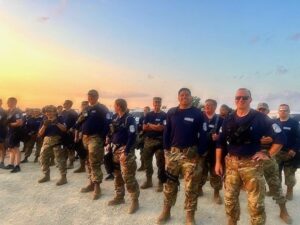
Story by Staff Sgt. Janae Masoner
139th Airlift Wing
Every three years the 139th Medical Group’s Detachment 1, which is the medical element of the Missouri National Guard’s Homeland Response Force, is put to the test on pre-hospital and field treatment during an external evaluation (ExEval). The detachment spent four days at the Crisis City Regional Training Center in Salina, Kansas, demonstrating overall readiness in response to a simulated disaster.
“The Medical Detachment 1 has been certified and validated by the Joint Integrated Evaluation Team to the chemical, biological, radiological and nuclear (CBRN) Response Enterprise standards,” said Lt. Col. Joe Lembke, medical plans officer of the 139th Medical Group Detachment 1. “Demonstrating our capabilities during the ExEval has enhanced our confidence and competency skills to deploy to any DOMOPS [domestic operations] disaster.”
The detachment’s medical professionals are trained at the highest level to meet Air Force requirements. All medics are required to complete trauma training and a HAZMAT operations course while nurses and doctors are required to complete Advanced Cardiac Life Support (ACLS), Pediatric Advanced Life Support (PALS) and Trauma Training; all of which are specific to the ExEval.
The ExEval takes place over four days consisting of four levels. Airmen trained on immediate response mission operations and commander focused training then concluded with a final test day where they were evaluated on their readiness.
“The purpose of the exercise was to validate the Missouri [Guard] Homeland Response Force’s overall readiness,” said Lembke. “The mission objective was to pass the ExEval, and the medical element passed!”
While this is a huge task for the detachment, they don’t complete the mission entirely by themselves.
The 139th Joint Incident Site Communications Capability (JISCC), a mobile communications system designed to outfit disaster first responders and other local, state, and federal agencies, goes with the detachment to every real-world training event, exercise and deployment. There are six personnel assigned to the 139th JISCC.
“The purpose of the JISCC during the ExEval was to provide the backbone of support for network connectivity across the footprint,” said Staff Sgt. Kahl Masoner, JISCC Terminal 332 NCOIC. “It provides a large suite of communications capabilities, and a service desk element to the HRF and CBRN TF, ranging from local tactical networks in the field to allowing all units to connect to the internet utilizing satellite communications and cellular modems to interoperability to local civil and federal authorities.”
The ExEval provides both the HRF and the JISCC with an opportunity to work through kinks to ensure complete readiness when deployed.
“The ExEval provided the JISCC with simulated, and some real-world, issues that we could face when deploying with the HRF/CBRN TF,” said Masoner. “These issues gave us the opportunity to develop new strategies for employing alternate equipment and methods to ensure the mission was still carried out and did not impact operations down range.”
Another team working alongside the HRF and JISCC was the 139th Fatality Search and Recovery Team (FSRT). There are 11 Airmen on the 139th FSRT and all 11 participated in the ExEval. They are expected to support locating, recovery and temporarily storing human remains in a CBRN or non-CBRN environment following direct guidance from that incident’s jurisdiction.
“On the ExEval they gave us a scenario and then we followed that,” said Tech. Sgt. Cecil Leivian, 139th FSRT member. “Once search and recovery, medical and all of them go through and mark where all the bodies are then we recover them and bring them back.”
“The one thing that has helped us is we all know each other’s strong points,” said Tech. Sgt. Dustin Stahl, 139th FSRT member. “We’ve worked together for years.”
Each unit is evaluated individually during the ExEval however, the teamwork and communication between all units involved is taken into consideration. The wing performed exceptionally well in each aspect of the evaluation.